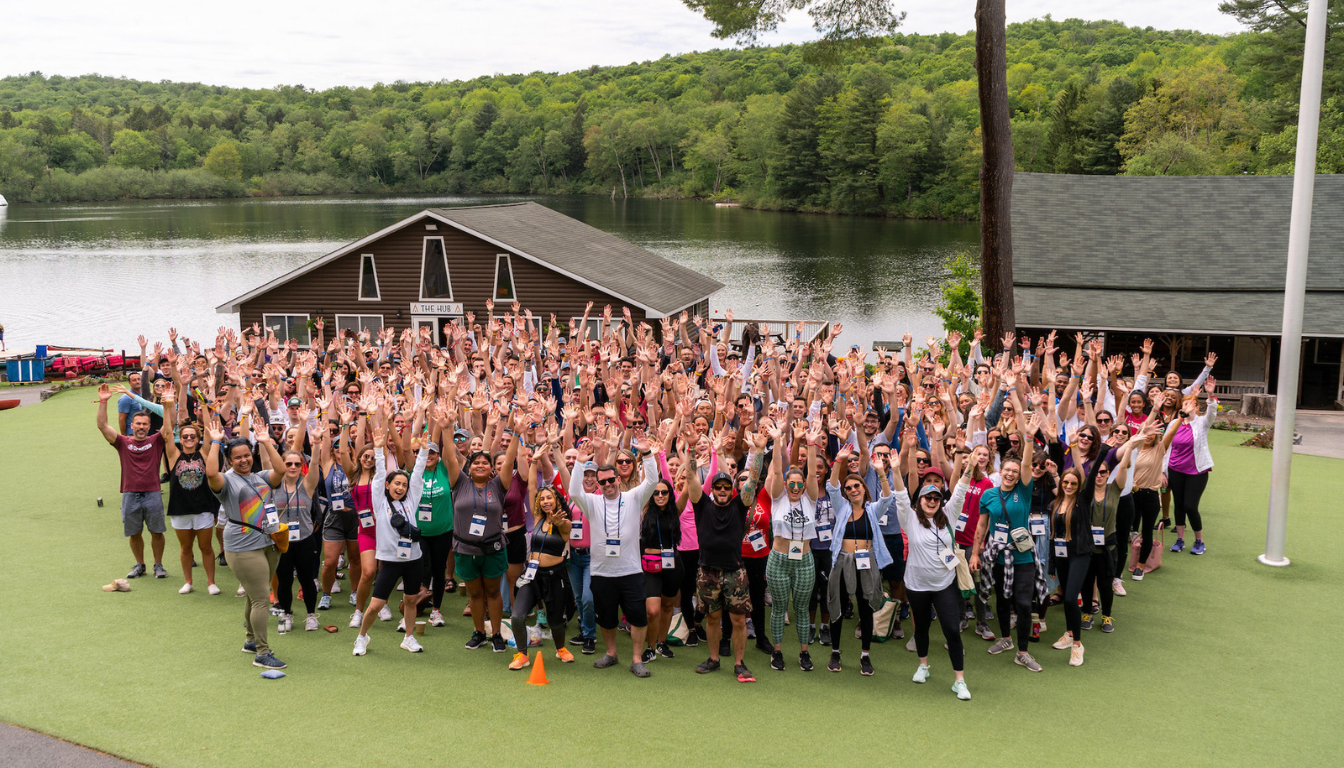Burnout at Work: How Offsite Retreats Help Exhausted Teams Recharge

In the whirlwind of project deadlines, team meetings, and overflowing inboxes, the modern workplace can be a hotbed for mental exhaustion.
This pervasive fatigue extends beyond mere tiredness, seeping into the core of our overall wellness. In this enlightening exploration, we'll delve into the world of workplace-induced mental exhaustion, unmasking its triggers, impacts, and the potent antidote – offsite team retreats.
The Unseen Enemy: Emotional Exhaustion in the Professional Arena

The corporate sphere, with its ceaseless flurry of tasks, meetings, and performance pressures, is an increasingly common breeding ground for a less visible adversary: mental exhaustion.
This insidious intruder, often manifesting as job burnout, infiltrates the working environment, inducing a persistent state of weariness that extends far beyond the realm of ordinary tiredness.
This profound fatigue steadily erodes your emotional, psychological, and physical efficiency, often subtly, making it an elusive and underestimated adversary.
Left unattended, it has the potential to deteriorate your productivity, work satisfaction, and personal well-being, making it a critical concern in the modern professional landscape.
Understanding and addressing this workplace intruder is vital to preserving the health of employees and maintaining the overall vitality of the organization.
Definition of Burnout
Burnout is a state of profound emotional, physical, and mental exhaustion brought on by prolonged stress, overwork, and a lack of balance in life. This debilitating condition can lead to feelings of hopelessness, detachment, and cynicism towards both work and personal life. Burnout doesn’t discriminate; it can affect anyone, regardless of their profession or position. If left unaddressed, burnout can have severe consequences on both mental and physical health, making it crucial to recognize and address its symptoms early.
Offsite Retreats: A Refreshing Pause

Offsite events and retreats serve as a refreshing pause button in the relentless pace of the corporate world, providing an essential platform for employees to momentarily disconnect from their daily professional routines. These retreats are more than just a change of scenery; they are a sanctuary for rejuvenating drained mental batteries and reigniting diminished enthusiasm for work.
During these retreats, employees can engage in activities designed to promote relaxation and reduce stress, such as mindfulness exercises, leisurely walks, or team games. This break from the constant pressure of deadlines and performance expectations can foster a sense of calm and renewal.
Furthermore, retreats provide the space for strengthening team connections. Through shared experiences and team-building exercises, employees can develop a stronger bond and better understanding of each other, enhancing their ability to work collaboratively and thus making the workplace a more enjoyable and less stressful environment upon return.
This thoughtful balance of rest, connection, and renewed focus makes offsite retreats—such as those facilitated by platforms like Offsite—not just a break from routine, but a strategic tool for addressing workplace fatigue and promoting long-term mental well-being.
The Corporate Culprits of Mental Exhaustion
Workplace mental exhaustion, a pervasive affliction in today’s fast-paced professional landscape, often has its roots in too much stress and a myriad of work-related stressors.
On the frontlines of these culprits are high-pressure deadlines, fostering a relentless race against time that continually stretches mental resources thin.
Next in line, interpersonal conflicts, whether with colleagues or superiors, can lead to chronic stress and unhappiness, gradually depleting your emotional reservoir. An environment that lacks support and understanding can significantly exacerbate the feeling of exhaustion.
Moreover, an imbalance between work demands and personal life can fast-track your journey towards mental exhaustion. This imbalance, if persistent, creates a sustained state of workplace stress, preventing effective mental recovery and fueling a sense of being perpetually drained.
Identifying and tackling these corporate culprits is paramount in protecting employees from mental exhaustion and promoting a healthy, productive work environment.
Recognizing the Red Flags

Mental exhaustion weaves its way through the corporate maze, often remaining covert under the guise of daily work stress, but the symptoms of burnout can be recognized if we’re alert enough. Yet, this crafty infiltrator leaves a trail of signs, if only we’re alert enough to recognize them. Its manifestations, seemingly harmless at first glance, can escalate in intensity and frequency.
You may find your attention wavering, concentration dwindling, and decision-making skills faltering. Simple tasks may suddenly feel overwhelming, leading to reduced productivity and output. Additionally, mental exhaustion often breeds a persistent sense of irritability, frustration, or disinterest towards work.
Physical signs too, are part of its repertoire. Constant fatigue despite adequate rest, frequent headaches, unexplained muscle aches, changes in appetite, and sleep disturbances are common bodily responses to sustained mental exhaustion. Recognizing these subtle indicators is the first step towards mitigating this invisible yet potent workplace enemy.
Physical Burnout Symptoms
Burnout manifests not only in emotional and mental symptoms but also in a range of physical symptoms. These can include:
- Chronic fatigue and exhaustion: Persistent tiredness that doesn’t improve with rest.
- Insomnia or sleep disturbances: Difficulty falling or staying asleep, leading to poor sleep quality.
- Headaches and migraines: Frequent and severe headaches that can disrupt daily activities.
- Digestive problems and stomach issues: Symptoms like nausea, bloating, and changes in appetite.
- Muscle tension and pain: Persistent aches and pains, often in the neck, shoulders, and back.
- Weakened immune system: Increased susceptibility to colds, infections, and other illnesses.
- Frequent illnesses and infections: Regular bouts of sickness due to a compromised immune system.
These physical burnout symptoms are often a direct result of chronic stress and emotional exhaustion, underscoring the importance of addressing burnout holistically.
The Bridge Between Mental Exhaustion and Burnout Symptoms

When unaddressed, mental exhaustion within the workplace can act as a perilous pathway, leading steadily towards the cliff-edge of employee burnout. Burnout, a grave state of chronic physical and mental exhaustion, is far more than mere tiredness. It represents an exhaustive depletion, a severe energy bankruptcy that can drastically interfere with your ability to function effectively in your professional sphere.
Yet, the effects of burnout extend beyond your work life. It can infiltrate your personal domain, overshadowing your relationships, leisure activities, and overall quality of life. The consistent state of stress and exhaustion can lead to a myriad of health issues, both physical and mental, including depression, anxiety, cardiovascular diseases, and a weakened immune system.
The gravity of these potential consequences accentuates the urgent need for early recognition and intervention of mental exhaustion. Recognizing the signs of mental exhaustion and taking proactive steps to manage it can help overcome burnout and halt its progress.
Employers and employees alike should be aware of this bridge between mental exhaustion and burnout, ensuring appropriate measures are in place to support mental wellbeing in the workplace.
Personal Factors of Burnout
While workplace stressors are significant contributors to burnout, personal factors also play a crucial role. These include:
- Perfectionism and high expectations: Setting unrealistically high standards for oneself.
- Low self-esteem and self-worth: Feeling inadequate or undervalued.
- Lack of control and autonomy: Experiencing little or no control over one’s work or environment.
- Poor time management and prioritization: Struggling to manage tasks effectively.
- Inability to say “no” and set boundaries: Overcommitting and failing to protect personal time.
- Lack of social support and connection: Feeling isolated or unsupported.
- Trauma and past experiences: Previous traumatic events that impact current stress levels.
These personal factors can significantly increase the risk of burnout, especially when combined with demanding work conditions.
Harnessing Offsite Retreats: A Path to Rejuvenation

One potent solution to the prevalent issue of workplace mental exhaustion lies in the thoughtful implementation of offsite team retreats. These corporate retreats serve as sanctuaries from the regular work environment, offering a much-needed intermission for employees to disconnect from work stressors and recharge their drained mental batteries.
These retreats aren’t just an escape; they provide a platform for fostering deeper team connections and managing stress effectively, facilitating better understanding and communication among members. Such enhanced camaraderie can create a positive company culture and working environment, making it more supportive and thereby reducing stress, a key contributor to mental exhaustion.
Moreover, offsite retreats often incorporate activities that promote wellness and relaxation. Whether it’s meditation, yoga, or simply engaging in fun team building activities outdoors, these elements can significantly aid in mental rejuvenation. Upon return, employees often bring back a fresh perspective and renewed vigor to their work, making offsite retreats a vital strategy in the battle against workplace mental exhaustion.
From Exhaustion to Exhilaration: The Power of Offsite Retreats
Understanding mental exhaustion in the workplace sets the stage for exploring the impact of offsite retreats on physical and mental health. These organized getaways can be potent tonics for rejuvenation, offering an antidote to workplace fatigue.
Sleep and Nutrition: The Restoration Duo for Physical and Mental Health
The synergy of adequate sleep and balanced nutrition forms a restorative powerhouse, crucial in tackling mental exhaustion. Offsite retreats often place an intentional focus on these two vital elements, fostering an environment conducive to restful sleep and offering meals rich in nourishing ingredients. Unplugging from the typical work routine in the serene setting of a retreat allows you to prioritize rest, affording your brain the downtime it needs to rejuvenate and process the experiences of the day.
Nutrition, too, plays an essential role, supplying the body and mind with the nutrients necessary for energy production and optimal cognitive functioning. Work retreats can serve as a perfect setting to reestablish a balanced diet, offering meals that are not just delicious but packed with essential vitamins, minerals, and other nutrients.
Together, quality sleep and balanced nutrition form a restoration duo, fortifying your mental and physical resilience, and ensuring you return to work refreshed, energized, and ready to tackle challenges head-on, alleviating physical and mental symptoms.
Team Building: Fostering Camaraderie

Fostering a strong sense of camaraderie among team members is a vital aspect of reducing workplace stress and mental exhaustion, and offsite retreats provide an ideal environment for nurturing these relationships.
Through various team-building activities, ranging from collaborative problem-solving tasks to fun, physical challenges, barriers are broken down, open communication is encouraged, and a mutual understanding between team members is enhanced.
A collaborative and understanding work atmosphere can significantly alleviate work-related stressors, a primary contributor to mental exhaustion. Therefore, offsite retreats play a key role in not just providing a temporary relief from work but also in initiating a lasting, positive shift in team dynamics, which can help mitigate mental health conditions.
Engaging in Mindful Activities to Manage Stress
Offsite retreats often integrate mindful activities like yoga and meditation into their schedule. These practices offer more than just physical flexibility or relaxation; they serve as powerful tools to enhance mental well-being. Meditation, for instance, encourages you to slow down, focus on the present moment, and let go of any stressful thoughts or concerns.
The practice of mindfulness and self-awareness can be a powerful strategy against stress, enabling you to better understand and manage your reactions to stressful situations. This acquired skill can then be brought back into the workplace, aiding in stress management, and consequently, reducing the risk of mental exhaustion.
By equipping you with these mindfulness tools, company retreats provide you with strategies to better manage stress and reduce mental exhaustion when you’re back in the grind of the workplace, and seeking guidance from a mental health professional can further enhance these benefits.
The Lasting Impact of Retreats
Offsite retreats aren’t a one-and-done solution; their impact reverberates far beyond the retreat period, resulting in lasting benefits that permeate the daily work environment. Employees often return to the office not just re-energized, but also with a rejuvenated mindset, leading to improved morale and productivity.
The time away allows for reflection and learning, equipping employees with valuable tools such as improved communication, stress management techniques, and even a more balanced approach to nutrition and sleep. These skills can be seamlessly integrated into daily work routines, thus becoming a sustainable strategy to combat mental exhaustion.
Ultimately, offsite retreats serve as a transformative experience, fostering a healthier, more positive organizational culture that supports employees’ mental well-being, leading to a more engaged and productive workforce, and highlighting the importance of health care support.
Reframing Work and Life

Reframing your approach to work and life can be a powerful strategy to prevent burnout. This involves:
- Changing one’s perspective and attitude towards work and life: Viewing challenges as opportunities for growth.
- Finding meaning and purpose in work and activities: Engaging in tasks that align with personal values.
- Setting realistic goals and expectations: Avoiding the trap of perfectionism.
- Prioritizing self-care and well-being: Making time for activities that nourish the body and mind.
- Building a support network and community: Cultivating relationships that provide emotional support.
- Practicing mindfulness and self-compassion: Being present and kind to oneself, especially during stressful times.
By reframing work and life, individuals can reduce stress and increase motivation, leading to a more balanced and fulfilling existence.
Promoting Work-Life Balance
Achieving a healthy work-life balance is essential for preventing burnout. Here are some practical tips:
- Setting clear boundaries between work and personal life: Designating specific times for work and relaxation.
- Prioritizing self-care and well-being: Engaging in regular physical exercises, hobbies, and relaxation activities and techniques.
- Taking regular breaks and time off: Ensuring adequate rest and recovery periods.
- Engaging in activities outside of work that bring joy and fulfillment: Pursuing interests and passions.
- Building a support network and community: Connecting with friends, family, and colleagues.
- Practicing mindfulness and self-compassion: Incorporating mindfulness practices to manage stress and maintain a positive outlook.
By promoting work-life balance, individuals can reduce stress, increase motivation, and improve overall mental and physical health, creating a more sustainable and enjoyable work environment.
Team building activities during retreats help to strengthen interpersonal relationships, enhance communication, and foster a sense of camaraderie among employees. By improving understanding and cooperation within the team, these activities can help reduce conflict and miscommunication
In Conclusion: Offsite Retreats - A Potent Antidote to Mental Exhaustion
In the battle against mental exhaustion, offsite retreats emerge as a compelling solution. Providing a pause from the relentless pace of professional life, these retreats offer a holistic experience of rejuvenation, camaraderie, and mindful practices, all designed to combat stress and replenish mental energy. With thoughtful event planning, as seen in experiences curated by teams like Offsite, retreats become more than just a getaway; they serve as a purposeful reset that supports both individual well-being and organizational health.
Moreover, the impact of these retreats is enduring, with benefits seeping into daily work life, fostering a healthier, more balanced work environment. Embracing offsite retreats could indeed be a game-changer, transforming workplaces into spaces of enhanced productivity, positivity, and mental resilience.
FAQs
- How can offsite retreats reduce mental exhaustion in the workplace?
Offsite retreats offer a welcome break from the day-to-day stressors of the work environment, providing an opportunity for employees to disconnect and recharge. The change of scenery and the chance to engage in non-work activities can help reduce feelings of exhaustion, while simultaneously promoting a sense of renewed energy and motivation. Furthermore, retreats that focus on team-building activities can improve workplace relationships, thereby contributing to a more positive and less stressful work environment.
- What activities during retreats contribute to mental rejuvenation?
Activities that foster relaxation and stress reduction are key to mental rejuvenation during retreats. This could include mindfulness exercises, such as meditation and yoga, which have been shown to reduce stress and improve mental well-being. Additionally, physical and adventure and challenge-based activities like hiking, games, or even simply exploring a new environment can help clear the mind and foster a sense of relaxation and renewed energy.
- How does team building during retreats impact workplace stress?
Team building activities during retreats help to strengthen interpersonal relationships, enhance communication, and foster a sense of camaraderie among employees. By improving understanding and cooperation within the team, these activities can help reduce conflict and miscommunication, which are common sources of workplace stress. Moreover, stronger team cohesion often leads to a more supportive work environment, where employees feel valued and stress is more effectively managed.
- What are long-term benefits of offsite retreats in combating mental exhaustion?
Offsite retreats can have lasting impacts on combating mental exhaustion. First, they equip employees with stress management tools that can be applied back in the workplace, promoting better mental health in the long run. Second, the improved team dynamics resulting from team-building activities during the retreat can lead to a more positive work environment, thereby reducing day-to-day stressors. Lastly, retreats signal that the organization values its employees’ well-being, which can improve job and employee satisfaction and motivation, reducing the risk of burnout.
You may also like
Unique spaces for your next offsite
Find distinctive venues for your upcoming corporate retreat.
Stay Updated with Our Insights
Get exclusive content and valuable updates directly to you.







